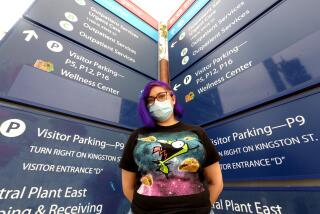Treatments of physical and mental health are coming together
Many days, the sheer weight of Iszurette Hunterâs clinical depression becomes more than she can lift. She clings to her bed in her South Los Angeles home. Important obligations slide away, including keeping appointments with doctors who are trying to control her asthma and high blood pressure.
âI donât have no desire,â she explains.
As the nation seeks to extend healthcare coverage to millions of new and in many cases chronically ill patients, one of the great parallel challenges to controlling costs and improving delivery of care will be managing the mental health problems of people like Hunter.
Already, about 2 million patients a year receiving care at government-subsidized community health centers also must be treated for depression, anxiety and other mental conditions, according to the National Assn. of Community Health Centers.
Officials expect many newly insured patients arriving at doctorâs offices and urban and rural clinics to have mental health complications. Beginning next year, some 2.3 million additional people may require mental health services through Medicaid, the public health insurance program for the poor, according to a study published in the American Journal of Psychiatry. Failing to diagnose and treat mental problems early can lead to far costlier visits to emergency rooms and hospitals later.
âPeople who are depressed or anxious or having other problems are less likely to get preventative or other primary care,â said Roderick Shaner, medical director of Los Angeles Countyâs Department of Mental Health. âTheir illnesses become greater in acuity before they are seen.â
Traditionally, primary care doctors and mental health practitioners have tended to treat the same patients with little coordination, experts say. Now, driven by the federal healthcare overhaul, officials in L.A. County and around the nation are confronting the financial and health consequences of poor collaboration.
County health departments are training physicians to better identify depression and other mental health problems. Doctors and therapists are sharing more information with each other about their patients. And health centers like To Help Everyone, or T.H.E., Clinic, where Hunter is treated, are expanding their mental health services.
The Affordable Care Act also expands mental health benefits and requires new health insurance plans to require depression screenings. During a speech last week, President Obama said improving diagnosis and treatment for people with mental illness is essential.
âItâs not enough to help more Americans seek treatment,â he said. âWe also have to make sure that the treatment is there when theyâre ready to seek it.â
In a small exam room at the South Los Angeles clinic one afternoon, Manuel Mares told the doctor his head was pounding, he felt dizzy and he had been vomiting. The previous month, Mares said, he had been to the emergency room three times with similar symptoms. Doctors there performed various exams but found nothing physically wrong. Mares said they diagnosed him with anxiety and prescribed medication.
Fidgeting and talking fast, Mares, 47, said he felt desperate. He hadnât worked in a year because of a shoulder injury. His wife had recently had surgery and his sonâs asthma was flaring up. âItâs like when you begin to put water in an empty cup and you put drop by drop in the cup until there is no more capacity,â he said. âThere has to be a limit.â
A clinic physician gave Mares a different prescription and urged him to see the clinicâs therapist, Neil Martin. But he left without doing so.
Many of the clinicâs patients have depression, which can cause symptoms such as headaches and cramps. They find it difficult to overcome because of other pressures such as getting a job, buying food and finding a place to live, Martin said. âTheir problems are multifaceted,â he said. âItâs so linked, physical and mental health.â
Martin says he tries to break the cycle of despair by identifying his patientsâ most pressing problem and working toward a solution.
Thatâs crucial to keeping patients healthy and reducing demands on the most expensive parts of the healthcare system, officials say. âWhen you are depressed, your pain is worse,â said Derrick Butler, associate medical director at T.H.E. Clinic. âWhen your pain is worse, youâre more depressed.â
Around the U.S., doctors and nurse practitioners typically spend just 15 minutes with patients â scarcely enough time to assess immediate physical ailments, let alone mental health issues, said John Bartlett, a senior advisor in the mental health program at the Carter Center.
âItâs a huge unrecognized problem,â Bartlett said. âAnd it really makes them continue to suffer.... Their medical conditions just donât get better.â
At T.H.E. Clinic, having a therapist available means staff members can compare notes on patientsâ physical and mental health, and counseling can begin more quickly, said nurse practitioner Sandeep Lehil. âIf you send them somewhere else, you never know if they are going to follow up,â she said.
One of Martinâs patients, Robert Brown, 52, is homeless and sleeping at a shelter. He sees a doctor for his diabetes and glaucoma and also suffers from depression and bipolar disorder. Brown recalled he was a âwreckâ when he first came to the clinic and felt like walking in front of a bus. After counseling sessions and medication, he told Martin during a recent visit, âI wonât say Iâm happy, but Iâm content.â
Integrating more mental health services with medical care in community clinics reduces the stigma patients may feel discussing emotional problems, said Robin Kay, chief deputy director of the L.A. County Department of Mental Health.
On a Friday morning, a new patient, Cindy Ayers, 56, visited Martin. She had been referred after a medical visit the previous week. Her foot tapped nervously.
âCindy, how can I help you?â Martin asked.
She was a heroin addict, Ayers said, and had been sober for years. Recently she relapsed and was hospitalized. She was feeling anxious.
After Ayers completed a written assessment, Martin said, âYour anxiety level is very high, and your depression level is high.â Martin asked whether she was feeling suicidal. Ayers shook her head no.
âI want you to promise me youâre not going to do that,â he said.
âNo, sir. I promise. I want to be alive.... I just want to be normal.â
âWeâre here for you,â Martin said. âOne day at a time.â
This is one in a series of occasional stories about To Help Everyone Clinic in South Los Angeles.
More to Read
Sign up for Essential California
The most important California stories and recommendations in your inbox every morning.
You may occasionally receive promotional content from the Los Angeles Times.










